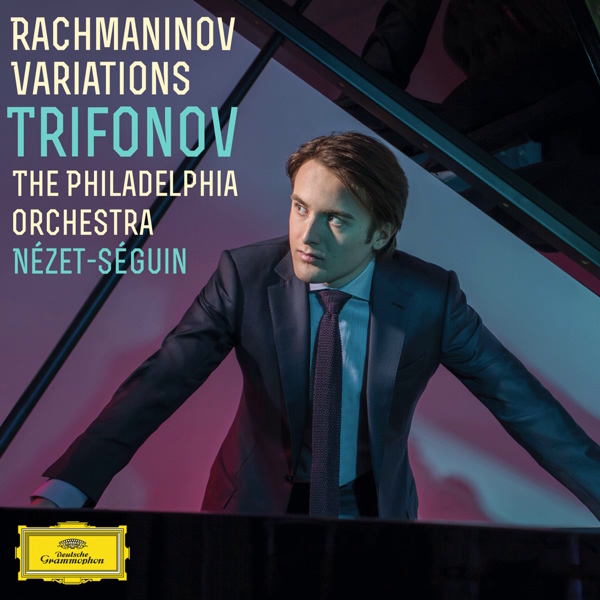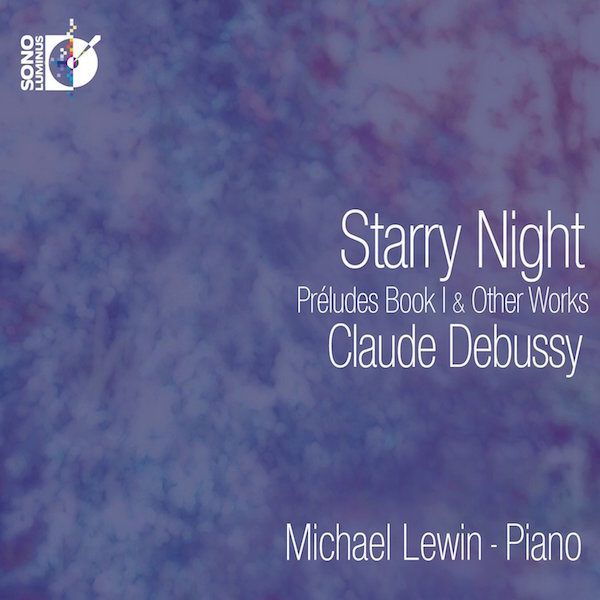Album Reviews: Danill Trifonov plays Rachmaninov and Michael Lewin plays Debussy
Danill Trifonov again demonstrates his supreme musicality and Michael Lewin’s new album must surely rank among the most poetic and sensitive Debussy recordings of recent memory.

By Jonathan Blumhofer
Is it too much to say that Danill Trifonov is the finest exponent of the piano music of Sergei Rachmaninov? There’s certainly some competition: Rubinstein, Horowitz, Gilels, Biret, and Argerich (not to mention the great man, himself) have to be on any short list. And let’s not forget Trifonov’s near(er) contemporaries, like Garrick Ohlsson, Evgeny Kissin, Denis Matsuev, and Nikolai Lugansky (to name a few). But the strengths Trifonov exhibits on Rachmaninov Variations, his compelling and exciting new album from Deutsche Grammophon, easily places him among the elites in this repertoire.
The most familiar inclusion on this disc is the Rhapsody on a Theme by Paganini. It’s not a piece that necessarily needs another recording—there are around 100 already from which to choose—but so smart are Trifonov’s interpretive choices, so innate his sense phrasing in this music, and so electrifying his execution of even the most mundane of gestures, that one has to work (hard) not to be drawn in.
First and foremost, Trifonov has a natural gift and feeling for Romanticism, particularly the unsettled Russian variety. He knows its ebbs and flows and, with a maturity that belies his 24 years, emphasizes not just its peaks and nadirs but makes much of the many dusky shades in between.
While Trifonov moves easily between the music’s emotional extremes, he also maintains an overarching view of musical narrative. As a result, nothing feels out of place. The Dies Irae iterations that dot the score are a case in point: They appear with such subtlety and understatement in this performance that they almost creep up on you. So, too, does the famous 18th variation, which, in lesser hands can turn into a swooning, self-indulgent rhapsody of its own. Here it passes by with lots of heart, clarity of texture, and beauty of tone; Trifonov doesn’t overplay it, nor does he underdo things—it’s simply the variation between nos. 17 and 19, but it also fits into a larger context, the structure of which Trifonov never loses sight. Yannick Nézet-Séguin and the Philadelphia Orchestra deliver an accompaniment filled with crisp rhythmic pizzazz and warm color, not to mention moments of sly humor.
The same pianistic characteristics carry over into Trifonov’s performances of the Variations on a Theme by Chopin and the Variations on a Theme by Corelli. Nothing he does in either of these pieces is lackadaisical or commonplace: His musical faculties are fully engaged, whether in his judiciously edited reading of the Chopin set (which takes Rachmaninov’s optional cuts of three variations and the final Presto) or his fluid account of the Corelli.
In between comes an original composition called Rachmaniana. Its five movements don’t hold any surprises or break any new musical ground, but they demonstrate Trifonov’s complete assimilation of Rachmaninov’s style and compositional techniques (they also grandly showcase Trifonov’s formidable technical skillset). And they do so in a substantial, impressive manner. This 11-minute-long piece is no mere cadenza: It’s well constructed, smartly balanced, and marked by some haunting moments (the tolling bell-like figures in the second movement are but one highlight). Yes, it might benefit from greater melodic variety and stronger contrasts of mood and texture, but Rachmaniana doesn’t overstay its welcome. It’s but another demonstration of Trifonov’s supreme musicality and musicianship, traits that, in their breadth, are unique among major pianists of any era or generation.
*****

Michael Lewin’s new album, Starry Night, his second all-Debussy disc, surely must rank among the most poetic and sensitive Debussy recordings of recent memory. Virtually everything he does in Estampes, the first book of Preludes, and the several independent pieces between them is clearly thought out and powerfully projected: he knows how to make this music speak and come to life in a special way.
This is demonstrated first in Estampes, a set of three musical “postcards,” the first evoking Japan; the second, Spain; and the last, France. In Lewin’s reading, the pagodas of the first are steeped in mystery: Gongs and bells clang while swirling pentatonic scales and melodies rise like incense. His attention to Debussy’s layered voices here is always keen, as is the sense of rhythmic ambiguity he cultivates from the score. Less cryptic, but still haunting and atmospheric (especially over its opening bars) is the second movement, habanera, with its playful, seductive tone and moments of sheer abandon. In this movement, as in the final “Gardens in the Rain,” Lewin clearly emphasizes the music’s narrative structure, mainly through careful gradations of dynamics and textures, and revels in its play of colors.
Textural balance and a strong attention to dynamic nuance also mark his account of the first 12 Preludes. I’ve long held Michelangeli and Krystian Zimerman as two of the finest interpreters of this music. Lewin doesn’t supplant them but this recording puts him in (or at least very near) their privileged company: He plays with remarkable intimacy and inwardness. If these Preludes might sound a bit more effortless or (occasionally) brilliant in other hands, there’s no denying that Lewin identifies with them in a special way and dramatizes the music behind the notes as well as anyone.
What I came away most impressed by in Lewin’s interpretation of these dozen miniatures is the huge world of contrast between them. From the tranquil, enigmatic first Prelude to the good-humored, characterful minstrel show 12th, these are pieces of striking ecumenicalism. There’s the dreamy, melancholy fourth Prelude (“Sounds and scents swirl in the evening air…”), in which Lewin delivers an impressive balance of textures, followed by the lively fifth (“The Hills of Anacapri…”), which gets a brilliantly spirited performance, again marked by timbral refinement. Lewin plays up the ferocious, violent climaxes of the seventh (“What the West Wind saw…”), turns in a devotional eighth (“The girl with the flaxen hair…”), and, with a strong emphasis on off-beat accents and grace notes, imbues the ninth (“The interrupted serenade…”) with humor and a good dose of Latin flavor. And so goes the whole set, lively, idiomatic, and characterful.
In between these two collections comes a beautiful, sweet-toned account of the Arabesque in E major and a whimsical Golligwog’s Cakewalk. Best, though, are two rarities from opposite ends of Debussy’s career: Les soir illuminés par l’ardeur du charbon (“Evenings lit by the burning coals”), a short piece written during the bitter last winter of Debussy’s life for the coal merchant who kept the composer well-stocked with the material despite a serious shortage of it in Paris during the War, and Koji Attwood’s rich-textured arrangement of the song “Nuit d’etoiles,” Debussy’s first published work. Lewin plays them both with sensitivity and color. Les soir, in particular, glows like the embers it depicts.
Sono Luminus’s recorded sound is full but never overbearing and puts the listener (as it were) in the room right next to the piano. The physical copy of the release comes with both standard CD and “Pure Sound” Blu-ray disc; both offer excellent audio quality. A few Gouldian moments notwithstanding (mainly Lewin singing or humming along with his playing), Lewin’s Starry Night is a fine, thoughtful addition to the Debussy discography.
Jonathan Blumhofer is a composer and violist who has been active in the greater Boston area since 2004. His music has received numerous awards and been performed by various ensembles, including the American Composers Orchestra, Kiev Philharmonic, Camerata Chicago, Xanthos Ensemble, and Juventas New Music Group. Since receiving his doctorate from Boston University in 2010, Jon has taught at Clark University, Worcester Polytechnic Institute, and online for the University of Phoenix, in addition to writing music criticism for the Worcester Telegram & Gazette.
Tagged: Danill Trifonov, Debussy, Deutsche Grammophon, Michael Lewin, Philadelphia Orchestra, Sergei Rachmaninov, Sono Luminus, Starry Night
